Vinyl fences typically last between 20 to 30 years, and may last even longer. Here is a comparison of the lifespan of vinyl fencing with some alternatives, with considerations specific to humid or salty areas. Of course, actual lifespans will vary based on care, location, installation process, and more:
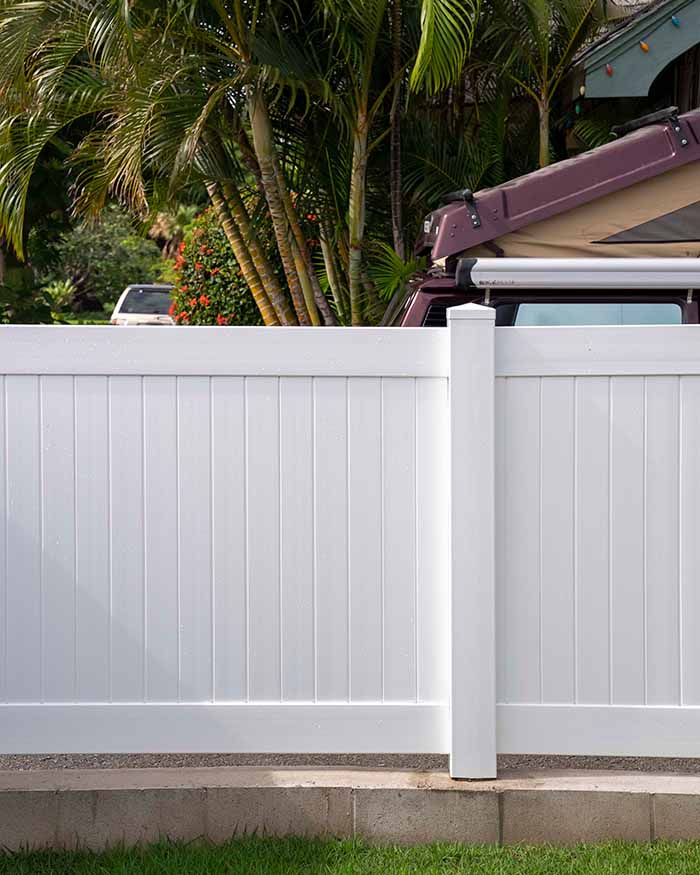
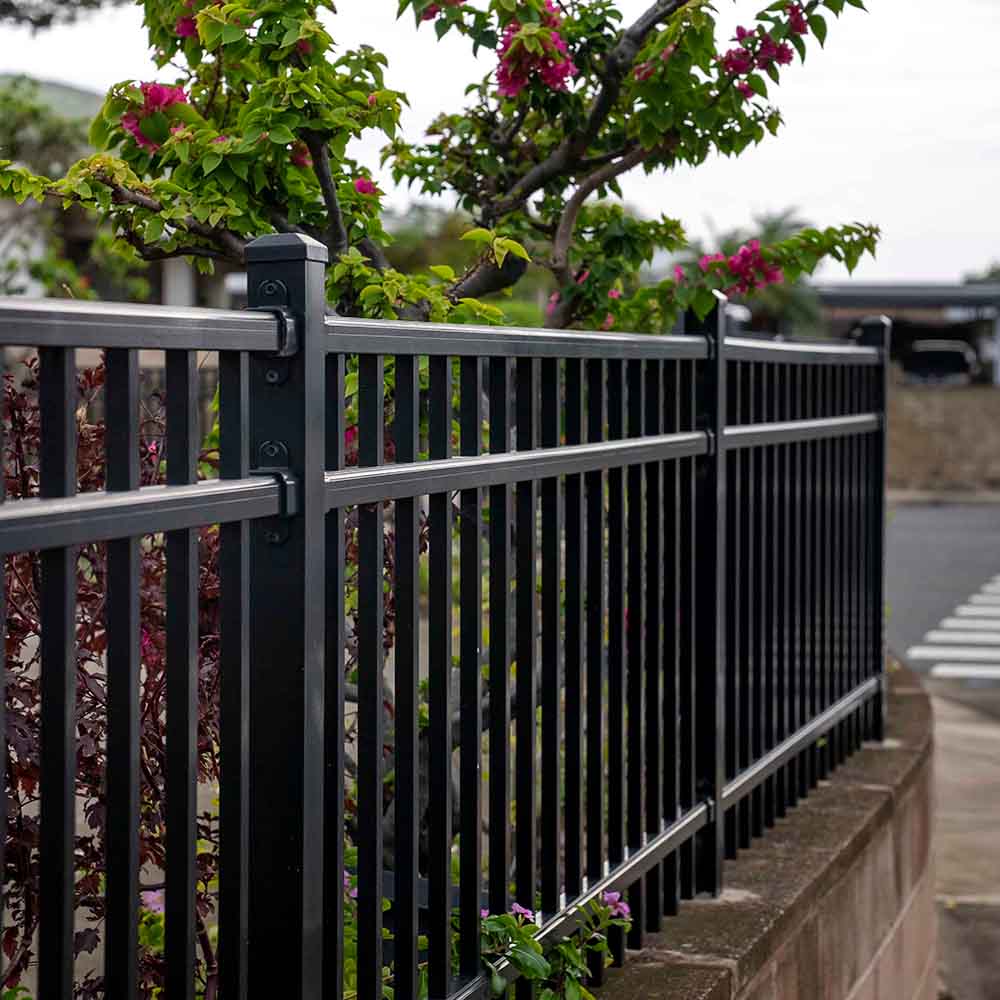
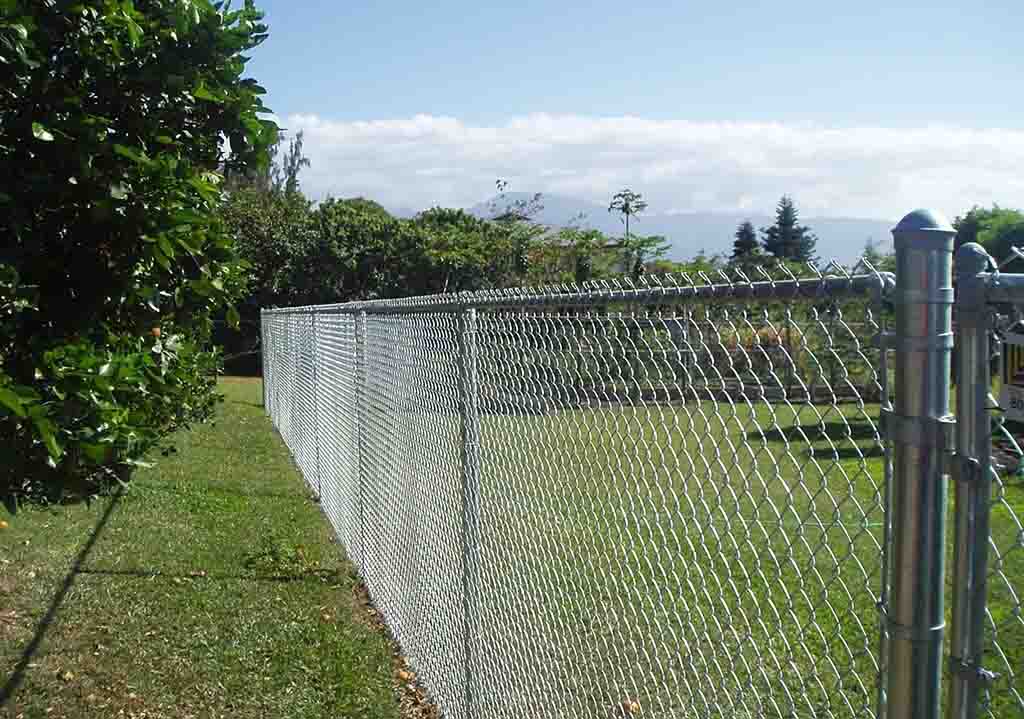
In summary, vinyl fencing is a durable and low-maintenance option that performs exceptionally well in humid and salty areas, making it a suitable choice for such environments. It offers a good balance between longevity, cost, and maintenance compared to other fencing options.
It may not be quite as durable as concrete, but it's relatively affordable and still very low maintenance.
To see examples of fencing installed in humid areas, check out our galleries.
When it comes to cleaning your vinyl fence, you may be wondering if using bleach is a good option. The answer to this question is a mix of yes and no. While bleach can be an effective cleaning agent, it can also potentially damage your vinyl fence. This blog post will cover best practices regarding bleach for vinyl fence, as well as provide other suggestions for cleaning your vinyl fence without risking damage.
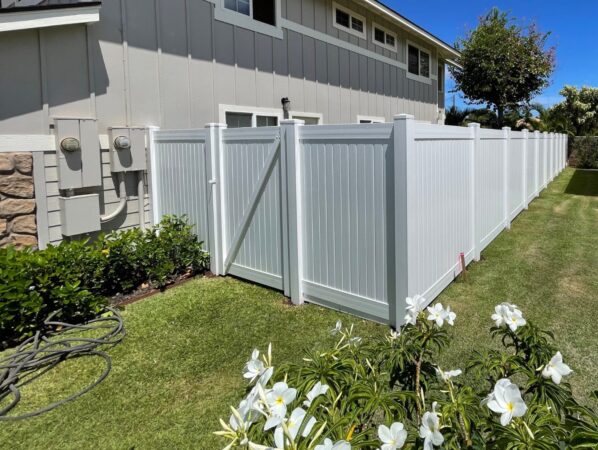
If you have a vinyl fence that needs a thorough cleaning, you may be wondering if it’s ok to use bleach. While bleach is a common household cleaner, it can damage vinyl fences if not used correctly. That's why it's important to pay attention to the instructions from the manufacturer when using bleach to clean your vinyl fence.
When cleaning your vinyl fence with bleach, make sure that you properly dilute the bleach solution. Read the label on your bleach product and follow the directions exactly as specified. If you use too much bleach, it can discolor and even damage your vinyl fence. We recommend only using bleach in extreme cases and only after other alternatives have been tried.
If you have a darker-colored or specialty vinyl fence, it is best to avoid using bleach altogether. It's also important to thoroughly rinse off any residue of the bleach solution to ensure that it doesn't cause any damage to your fence.
By following these tips for cleaning your vinyl fence with bleach, you can help ensure that your fence remains in good condition for years to come.
If you’re worried about the effects of bleach on your vinyl fence, there are plenty of alternatives that can help you clean it. These include:
1. Spray your fence off with a hose: One of the simplest ways to clean your vinyl fence is to simply spray it down with a hose. You may want to use a nozzle or pressure setting that won’t cause any damage. Doing this regularly will keep your fence looking new.
2. Use a Mr. Clean Magic Eraser: This is a great way to tackle stubborn dirt or scuff marks on your vinyl fence without having to use harsh chemicals. All you need to do is wet the eraser and lightly scrub the surface of your fence until the marks disappear.
3. Use a Simple Cleaning Solution: If you don’t want to use bleach, try mixing warm water and mild dish soap in a bucket and use a dish towel or washcloth to gently scrub away dirt and grime. Be sure to rinse off the solution afterward with a hose.
4. Make a DIY Cleaner: To make a homemade cleaner for your vinyl fence, mix ½ cup of white vinegar with 1 to 2 gallons of water. Next, wet a rag with the solution and wipe down the fence. Thoroughly rinse your fence with water.
5. Use a Specialized Cleaner: There are also several specialized cleaners available specifically for vinyl fences. Be sure to follow the manufacturer's instructions when using these products. For more stubborn stains, you can try using a xylene cleaner. Xylene is a strong and reliable chemical compound that is an effective way to keep your vinyl fence looking clean. However, you should always take caution when using a chemical like a xylene on your fence. Before applying, it’s best to wear gloves and protective eyewear and to cover any nearby vegetation with a tarp to prevent damage.
6. Use a Pressure Washer: A pressure washer can be used to remove deep-set dirt and debris from your vinyl fence. When using a pressure washer, be sure to use the lowest pressure setting possible to avoid damaging the material. Do your research when choosing your pressure washer - generally, you'll want one with around 2,000 or 2,800 PSI to clean your vinyl fence.
No matter which option you choose, regular maintenance and cleaning of your vinyl fence is important for keeping it looking its best. By following these Tips for Cleaning Vinyl Fence, you’ll be able to keep your fence in great condition for years to come.
The best way to avoid having to use harsh, chemical-based cleaning agents (such as bleach), is to regularly maintain your vinyl fence. Keeping your vinyl fence clean is essential to its longevity and appearance. Fortunately, it doesn't need to be a chore. Simply spray it down with a hose, as necessary, to keep it looking its best. If you're looking for an added level of clean, give it a soapy wash every few weeks (using a mild dish detergent, such as the blue Dawn). For extra protection against mold and mildew, consider using a protective coating such as Mold Armor or Moldex.
By following these simple tips for cleaning and maintaining your vinyl fence, you can ensure that your fence will remain beautiful and strong for years to come.
Vinyl and PVC are two of the most common materials used in fencing, siding, and other home improvement projects. But what is the difference between them? Both are plastic-based products and are suitable for different uses, including fencing. In this blog post, we will discuss the differences between Vinyl and PVC, and why the terms are used so interchangeably — so you can decide whether a Vinyl Fence is a good option for your home or business!
Vinyl is a type of plastic used in many common applications. It has been modified with fortifying additives to make it stronger and more durable. There are many types of plastics that are used every day, including the following:
- EVA - (Ethylene Vinyl Acetate) - used in wire coatings, films, and adhesives
- PEVA - (Polyethylene Vinyl Acetate) - used in shower curtains
- PVA - (Polyvinyl Acetate) - used in paints and adhesives
- PVC - (Polyvinyl Chloride) - used in pipes, plumbing, & fencing (among other uses)
Vinyl is weather-resistant, low maintenance, and won't degrade in the sun, making it ideal for outdoor applications such as fencing, decking, and siding. Vinyl fencing is a great option for homeowners looking for security, privacy, or an attractive accent to their home. Vinyl fences are available in a variety of styles and colors to imitate the look of wood. They also provide the perfect definition of borders and landscaping, while ensuring safety and security. Plus, they require little to no maintenance, giving you peace of mind knowing your vinyl fence will look great for years to come. You can take comfort in knowing that our vinyl fencing is also backed by a lifetime limited warranty!
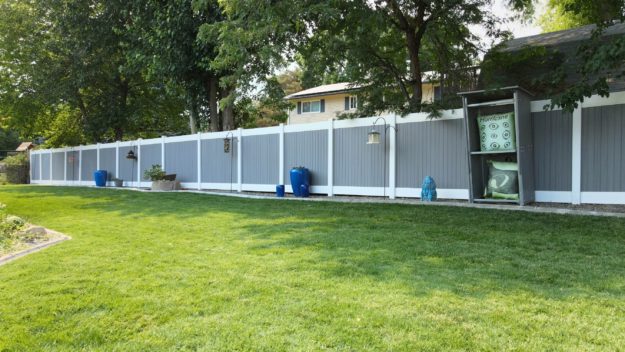
Often, when people hear the term 'PVC', they think of PVC pipes or plumbing. But PVC fencing, while
similar in properties, is not made out of PVC pipes (though there may be some DIYers out there who are working on making this a style!) This is part of the reason why the term 'vinyl' is used for PVC fences — clarity and unified terminology. It sounds a bit more aesthetic and lends to a more favorable impression when describing fencing.
A simple way to look at it is — not all vinyl is PVC, but all PVC is vinyl. So, while in the fencing industry, you may often find the terms used interchangeably, when you hear someone talk about PVC fencing, they are referring to Vinyl Fencing. You can be sure that when you pick out your new vinyl fence, you are getting durable, maintenance-free, weather-resistant PVC.
We have a variety of vinyl fencing styles to choose from — such as privacy, semi-privacy, lattice top, picket top, alternating picket, closed picket, open picket, scalloped picket, and ranch rail. We also have a variety of color options, including our Signature Series selections that are designed to give the aesthetics of wood. Request your free estimate today to discover all our vinyl fence options — and if vinyl isn't a good fence, your Project Coordinator can help you decide which material choice best fits your needs. Don't forget to ask about our special financing options!
If you are looking for a new garden gate, you may be considering vinyl as an option. Vinyl is a popular choice for garden gates because it is durable and low-maintenance. These are just some of the benefits of vinyl garden gates for your home.
For many people, the cost of a garden gate is a major consideration. After all, gates can be quite expensive, and not everyone has the budget to splurge on an elaborate design. Vinyl gates offer a more affordable option that doesn't sacrifice style or quality. Whether you're looking for a simple picket fence or an ornate wrought-iron gate, there's a vinyl option that will fit your budget.
While functionality is always the top priority when it comes to garden gates, there's no reason that they can't also be visually appealing. Vinyl garden gates offer homeowners the perfect blend of form and function, with a variety of styles available to suit any taste. From simple and classic white picket fences to more ornate designs inspired by Victorian architecture, vinyl garden gates can add instant curb appeal to any home. Whether you're looking for a gate to match your existing fence or want to add a touch of style to your landscaping, vinyl garden gates are a great option.
There are many reasons why homeowners might choose to install vinyl garden gates. In addition to being attractive and durable, vinyl gates require very little maintenance. Unlike wood gates, which need to be regularly sealed and painted, vinyl gates will retain their original appearance for years with only occasional cleaning. And in the event that a vinyl gate does become damaged, it can usually be repaired quite easily. For all of these reasons, vinyl garden gates are an excellent choice for busy homeowners who want to enjoy their outdoor space without having to worry about constant upkeep.
Vinyl garden gates offer several advantages over other types of gates. They are durable, easy to maintain, and attractive. Vinyl is an excellent material for outdoor use because it resists weathering and fading. And, because it is non-porous, vinyl is also resistant to mold and mildew. Wood, on the other hand, will start to grow mold and mildew over time, limiting its long-term viability. Best of all, vinyl garden gates require very little maintenance. A simple washing with soap and water is all that is needed to keep them looking like new. For these reasons, vinyl garden gates are an increasingly popular choice for homeowners who want the beauty of a traditional gate without the hassle of upkeep.
Garden gates are a must for any home, and vinyl is the perfect material. No matter the style, the home, or your budget there is a perfect vinyl option. If you want to gain these benefits, be sure to get a vinyl garden fence.
Looking to get a vinyl garden gate and fence for your home? Check out the options available from the experts at Best Vinyl Hawaii!
As you design your fence, you can’t forget about the gate. The gate you install should compliment your fence. Typically, you want to use the same style as your fence and it should also be a similar height. There are several styles of vinyl gates available; each can be customized to the type of gate you need.
A privacy gate is ideal for someone who wants to keep out prying eyes. A privacy vinyl fence is made up of vinyl planks that are all flush together to prevent any gaps in the fence. You can maintain total privacy in your yard. Installing a privacy gate to match means you keep that privacy while still allowing access to the area. With a privacy gate, you can choose from a couple of options on how the gate will open. A typical swinging gate will open inwards or outwards. You can have a single-door gate or a double-door gate. Keep in mind, you will need space for the gate to swing. You can also opt for a sliding gate. This reduces the need for space but is a little more complicated to install and may require more maintenance.
A semi-private design will still give you some privacy while also allowing airflow in your yard, more light, and some view of what’s beyond your fence. With a semi-private fence, vinyl planks are placed on either side of the fence so they are in line with each other, but there is space between the fence. When looking directly at the fence, it looks solid. From an angle, you can see through it. A semi-private gate is a good option if you don’t need 100% privacy and want to have a little more visibility.
Not all fences are designed just for privacy. A picket fence leans more toward the aesthetic as well as marking the property line and containing the yard. Picket fences have vinyl planks that are evenly placed along the fence with space in between each plank. You can choose from several sizes for your picket fence. You can have a tall picket fence for your backyard or a short fence (usually about waist-high) for your front yard. Adding a picket gate to your fence creates a charming look that also creates a clear line for your property.
A ranch rail-style fence is, as the name implies, typically used on ranches, farms, and in rural areas. This style of fence is an inexpensive way to mark your property and keep larger animals contained. A ranch rail gate will typically be a swing gate that requires plenty of space for it to be opened. Installing a ranch rail gate and fence can give your home a more rural and rustic look.
There are plenty of styles out there depending on the needs of your fence and the look you want. Before purchasing a fence and gate, take time to consider what the main purpose of your fence is. Some options cater to privacy while others to style. You can even find a style that gives you the best of both worlds.
At Best Vinyl Fence & Deck, you can find all the materials and styles you need. Click here to explore your options.
When designing a fence, you’re faced with a lot of decisions. Picking the material for your fence can depend on your purpose for the fence, your price range, and the style you’re looking for. Fortunately, you have plenty of options to choose from.
Vinyl is still a relatively new material, but it is widely popular. Over the years, vinyl manufacturers have made it into a very durable material. Some vinyl fences even come with a lifetime guarantee. In addition to being long-lasting, vinyl is also very durable and low-maintenance. Once your fence is installed, there isn’t much left for you to do. At most, you’ll need to occasionally wash off dirt and grime. Vinyl is also a very aesthetically pleasing material. It can look like wood without the maintenance that comes with it. You can also get vinyl in a variety of colors and styles to suit your taste.
Many people have steered away from wood fences because wood is more susceptible to damage from the weather, pests, and time. If you want to still have a wood-like appearance without all the maintenance, then you might want to go with a composite fence. Composite is made from wood fibers and plastic, so it is more durable while still having the look you want. A composite fence will also add noise reduction to your yard so you can enjoy your privacy.
A steel fence can provide you with a variety of benefits. First of all, it’s a very durable material. It doesn’t degrade over time and it will keep your yard protected. It’s also a very cost-effective material. It’s relatively inexpensive and it lasts for a very long time. You can also feel more secure when inside a steel fence. Since it’s such a strong material, it’s very difficult for someone to break in via your fence. To top it off, steel is a stylish choice and it’s easy to maintain. All you really need to do is repaint it every once in a while to protect it from rust.
Metal fences are a classic look for any home. They are the best option for someone who is primarily concerned with property demarcation or containment. These fences will outline your property with style. The added benefit of an ornamental metal fence is you can customize it in several ways. You can choose a pattern that best fits your taste and you can even add decorative toppers to your fence. An ornamental metal fence is easy to install and it will stand the test of time. You don’t need to worry about rust, mold, or mildew. As far as maintenance, you simply need to clean it off every once in a while.
If privacy isn’t your priority, then a chain link fence could be an ideal option. These fences are durable and cheap to install. You can cover a wide area for very little money. A chain link fence is the perfect choice for anyone who’s trying to keep children and pets protected in their yard. You can also install a chain link fence around a very large piece of land to keep everything contained without spending a lot of money on other materials.
Before you settle on a material, consider what your fence is being used for. Your priority could be privacy, protection, or more. The main purpose of your fence will help you determine what material is best for you.
Best Vinyl Fence and Deck carries several materials for fences. Click here to explore what’s available.
Wood has always been a very popular fencing material. One of the main reasons is because wood is typically readily available. Other common fencing materials include chain link, aluminum, and steel. However, with new types of advanced materials coming on the market (including long-lasting and stylish vinyl), traditional fencing is facing some serious competition.
While aesthetics definitely play a part in picking a fence, how else do you choose between a vinyl or wood fence? The answers lie in the comparisons of cost, maintenance needs, and longevity.
A few things need to be taken into account when determining how much vinyl or wood fencing costs. First, there’s the initial cost of the materials. Then, there’s the cost of installation. Finally, there’s the cost of maintaining and repairing the fence.
Here’s an estimate of costs you’re looking at for each type of fence.
Wood Fencing Costs:
Vinyl Fencing Costs:
If you want a more definitive answer to how much a fence will cost you, it’s a good idea to get a free estimate before committing to a purchase.
There is a big difference between the maintenance requirements of wood and vinyl fencing. Wood requires a lot of consistent attention to keep a pleasing appearance. It needs restaining or repainting at least every couple of years and since the weather and pests play a toll, a wood fence will need regular repairs to keep it from completely falling apart.
On the other hand, vinyl requires no maintenance other than an occasional spray down with a garden hose to keep it clean. Harsh weather and pests don’t affect vinyl so there is no upkeep either.
You’ll want to place heavy emphasis on the longevity of materials before choosing between wood and vinyl. Wood can last up to 20 years, but keep in mind that this is the best-case scenario which includes constant refinishing, repainting, restaining, repairing, and replacing.
Vinyl, however, is durable enough to last up to 100 years, even with very little maintenance.
As a quick reference when deciding if you should choose a vinyl or wood fence, we’ve listed some pros and cons of each.
Pros of vinyl fencing:
Cons of vinyl fencing:
Pros of wood fencing:
Cons of wood fencing:
Now that we’ve gone over the details, you are armed with the knowledge that vinyl fencing is a long-lasting, no maintenance, cost-effective choice for your new fence. Now all you need to do is contact Best Vinyl today to get started on your vinyl fencing project!
A well-constructed, quality fence can do many things for your home. It can keep neighbors out, keep children and pets in, and enhance the aesthetic appeal of your property. The bad news is that fence installation can get expensive—but it doesn’t have to.
We’ve put together a list of some of the most affordable fence options for your home that won’t break the bank.
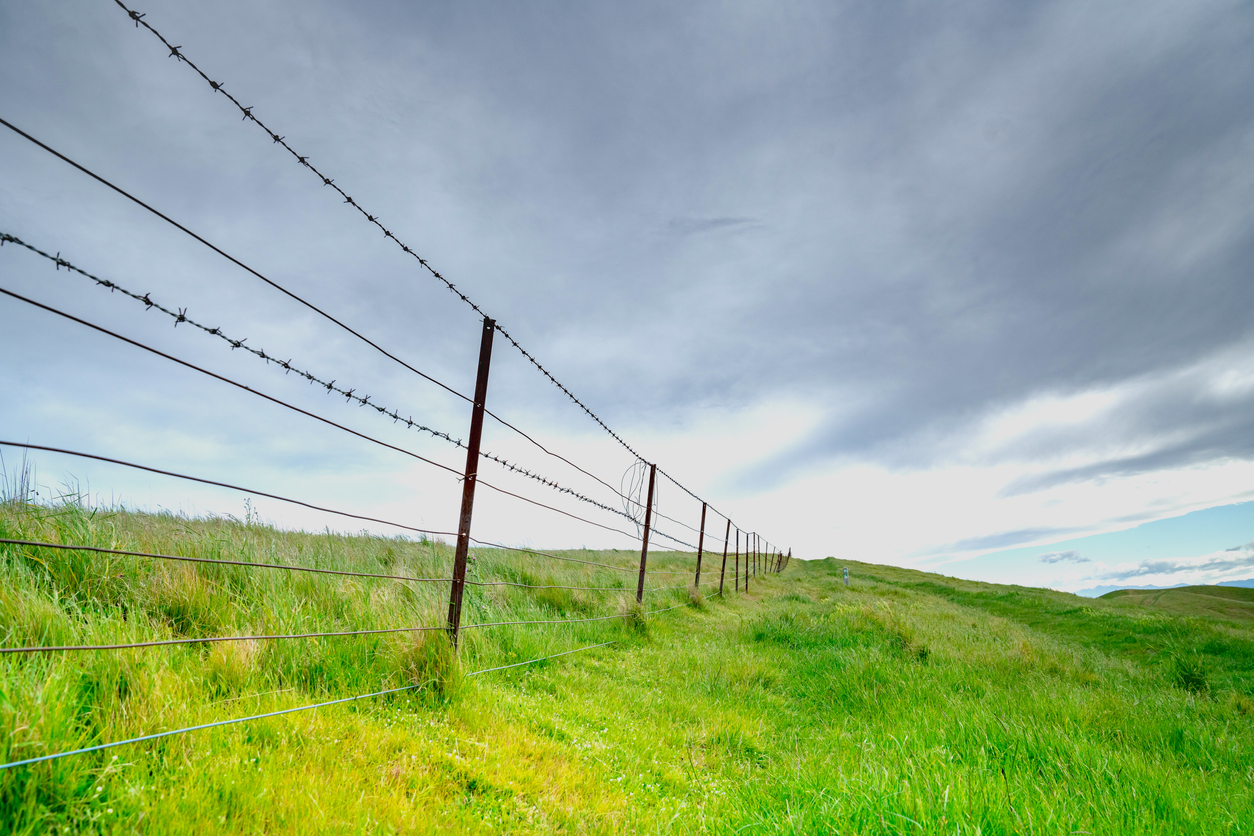 Definitely one of the most budget-friendly fencing options, a hog wire fence is known for its simple ability to keep in small animals and to mark property boundaries. Hog wire is usually strung along wooden railings, meaning that you can pair this material with different types of wood for the aesthetic you want.
Definitely one of the most budget-friendly fencing options, a hog wire fence is known for its simple ability to keep in small animals and to mark property boundaries. Hog wire is usually strung along wooden railings, meaning that you can pair this material with different types of wood for the aesthetic you want.
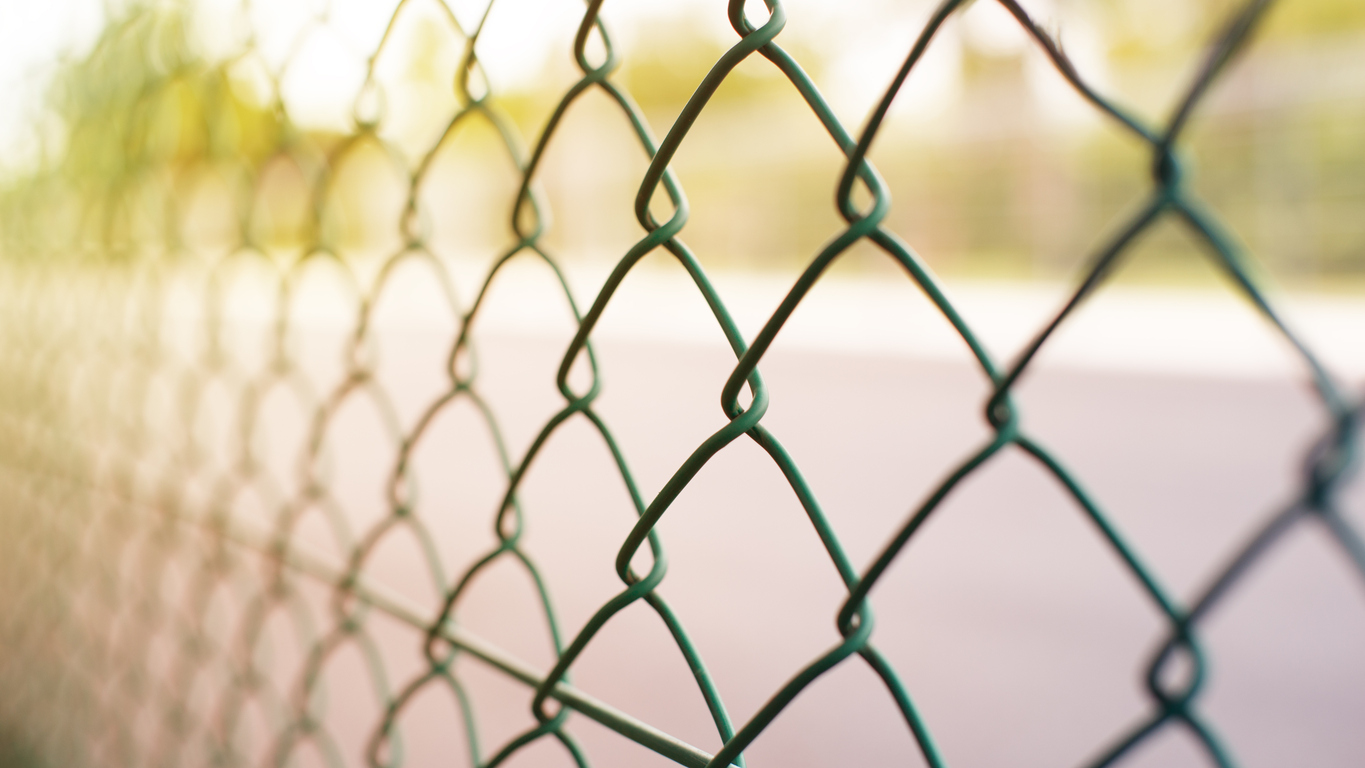 Chain link comprises interlacing metal wires, resulting in a fence that is both budget-friendly and strong. While this fence doesn’t offer much when it comes to privacy or looks, it does well as a property boundary, as well as keeping strangers out of your yard.
Chain link comprises interlacing metal wires, resulting in a fence that is both budget-friendly and strong. While this fence doesn’t offer much when it comes to privacy or looks, it does well as a property boundary, as well as keeping strangers out of your yard.
 Pine fences consist of panels that are treated to resist rot and pests. Not only does this make the fence strong but they also tend to be aesthetically pleasing. Keep in mind that pine fences have a higher risk of warping or twisting, so be sure that your fence panels are of the highest quality—especially if you’re in a humid, rainy area like Hawaii.
Pine fences consist of panels that are treated to resist rot and pests. Not only does this make the fence strong but they also tend to be aesthetically pleasing. Keep in mind that pine fences have a higher risk of warping or twisting, so be sure that your fence panels are of the highest quality—especially if you’re in a humid, rainy area like Hawaii.
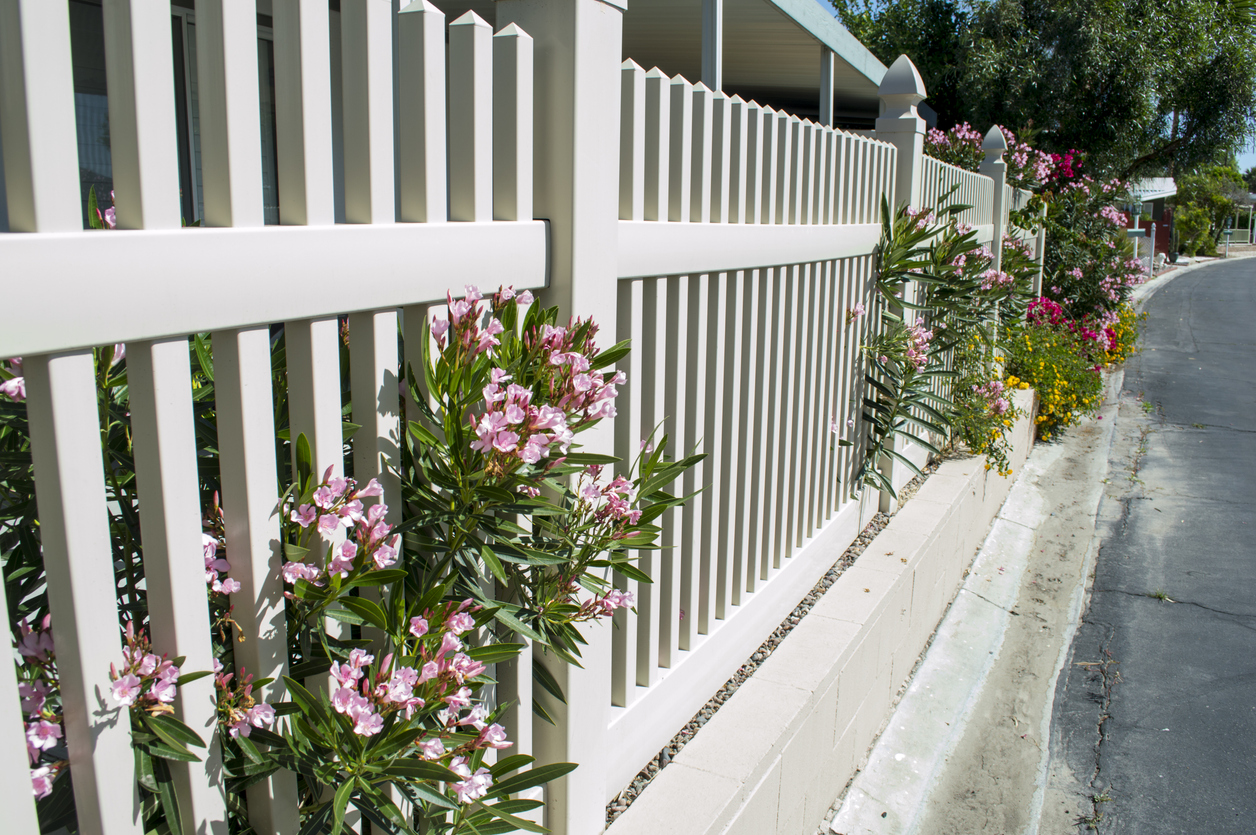 At first glance, vinyl may not appear to be budget-friendly due to its initial installation cost. But it’s the quality features of a vinyl fence that make it a great deal. Vinyl is well-known to be both strong and durable, allowing it to withstand punishment. It also requires almost no maintenance, meaning that you’ll spend less money in the long run.
At first glance, vinyl may not appear to be budget-friendly due to its initial installation cost. But it’s the quality features of a vinyl fence that make it a great deal. Vinyl is well-known to be both strong and durable, allowing it to withstand punishment. It also requires almost no maintenance, meaning that you’ll spend less money in the long run.
If you are interested in learning more about affordable fencing options, contact Best Vinyl today. Also, our most recent blog in January talks about how to choose the best material for a fence for your home. This insight will make it a lot easier to choose which fencing option you want to go with!
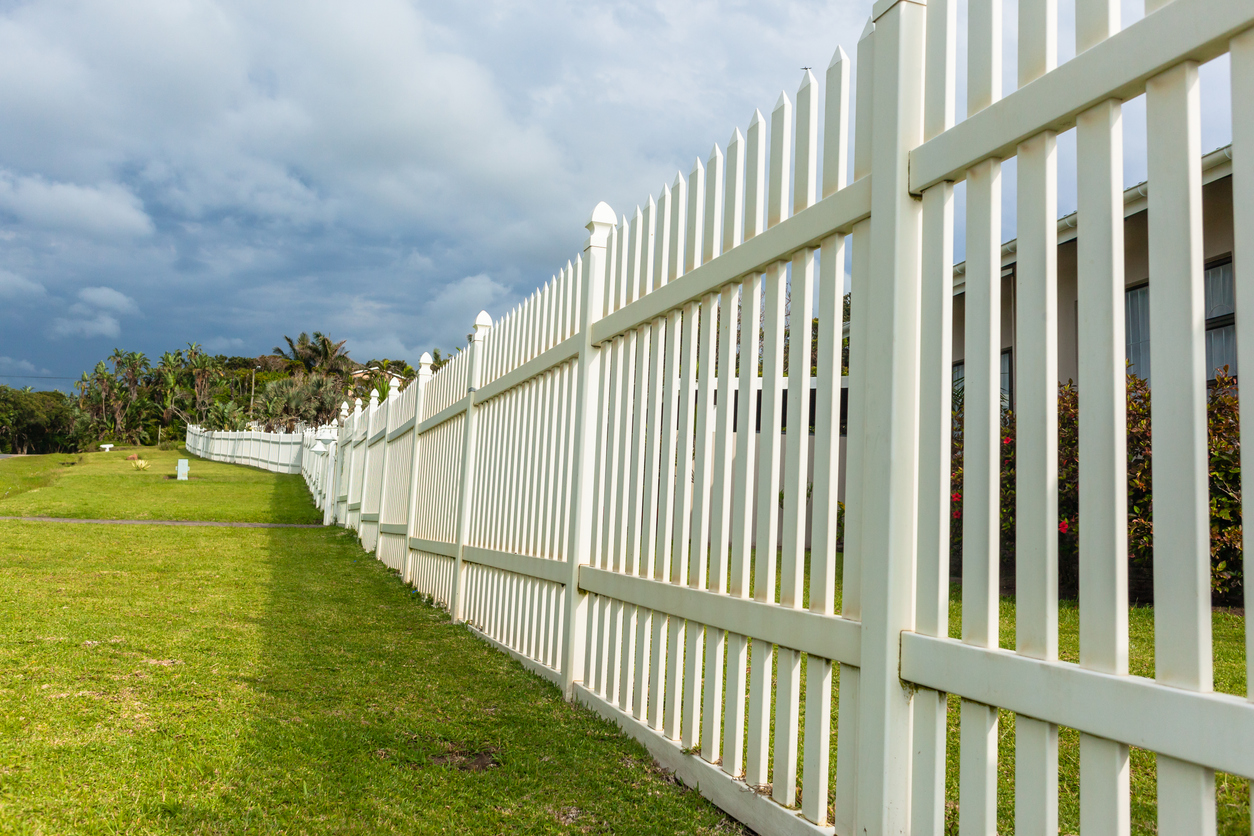 If you want to install a new fence at your property, you probably have a lot of questions. Will it look good? How much will it cost? Will it protect your pets or children?
If you want to install a new fence at your property, you probably have a lot of questions. Will it look good? How much will it cost? Will it protect your pets or children?
Here’s another very important question: what material will the fence be made out of? The answer to this will define the fence’s strength, aesthetics, lifespan, cost and more. That’s why you have to pick the best material for a fence first.
Read on to learn how to choose between five popular fence materials and pick the right one for your needs.
To easily choose between fence materials, start by understanding the pros and cons of each. Here are five major fencing materials to consider.
Chain link fences are tough and cheap. They divide a property efficiently but don’t always look great. Also, they don’t protect a property well (without adding barbed wire).
Pros:
Cons:
Vinyl fences often look like wood but won’t split, crack, burn, or attract pests. They also don’t create splinters or require much maintenance.
Pros:
Cons:
Aluminum fences are attractive and come in a variety of styles. They’re easy to take care of but take extra time to install.
Pros:
Cons:
Steel fences are the strongest type, which is perfect for security. They’re easy to maintain, but hard to install. The material is also expensive.
Pros:
Cons:
Wood is a beautiful and sustainable material that comes in many diverse styles. However, it can be damaged by insects and weather and over time can require a lot of maintenance.
Pros:
Cons:
Have you decided on the best material for your fence? You can get a free quote online for the type of fence you’d like Best Vinyl to install for you. Order the beautiful fence you want today!
Choosing the perfect fencing option can be a challenge, especially if you don’t know a lot about the different types and products available. However, once you start comparing features like durability, maintenance, and aesthetics, the choice becomes pretty clear. A white vinyl picket fence provides a lot of benefits you may not have considered.
While wood fences require regular painting or staining, a white vinyl picket fence retains its color and texture for years. It is also extremely easy to keep clean. If it gets dirty, you can simply spray it off with a hose and it will look as good as new. You’ll save yourself a lot of time and money in the long run when you factor in the maintenance costs of wood, iron, or chain-link fencing. In addition, installation is so easy you can do it yourself if you prefer not to hire a fence company to do it for you.
Vinyl fence materials are five times stronger than wood, which means they are built to endure harsh weather conditions, including strong winds and beating sun. A white vinyl picket fence will not fade from sun exposure, and the flexibility of the material allows for some give when gusts of wind put pressure on the panels. If a section does get damaged, it is much easier to replace a vinyl fence panel than several pieces of wood. You will also be able to match old sections seamlessly. Vinyl fencing is also more durable because it is not susceptible to damage from insects or animals.
Another advantage to choosing vinyl for your fencing material is that you have a lot more beautiful design options to choose from. You can surround your yard with a traditional style white vinyl picket fence, or choose from ornamental vinyl, lattice top, multigrain, ranch rail, or a solid panel for privacy. These are just a few examples of the products available through Best Vinyl in Hawaii. There are also color variations for further customization.
When you are ready to begin your vinyl fence project, contact a fence company with knowledge and expertise to answer all your questions. With Best Vinyl, you can even get a free estimate so you’ll know what to expect in terms of cost before you start.
At Best Vinyl, we take pride in the precision and quality of our work, and we don’t cut corners. This means that in addition to a beautiful fence, we are able to provide you with the best warranty possible. Visit our website and learn more about Best Vinyl in Hawaii and give us a call today to get your vinyl fence project started!